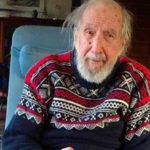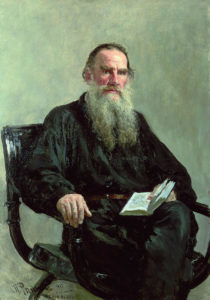We Need Their Voices Today! (13) Count Leo Tolstoy
TRANSCEND MEMBERS, 18 Sep 2017
John Scales Avery, Ph.D. – TRANSCEND Media Service
Introduction
This is a collection of biographical sketches showing people whose wise voices from the past can help to guide us today. All of the women and men, brief glimpses of whose lives and ideas are portrayed here, gave a high place to compassion. None of them was a slave to greed. We need their voices today!
[Note from TMS editor: It will be posted one biographical sketch per week]
**********************************************
Leo Tolstoy was born in 1828. While he was still a child, his parents died, and he became Count Tolstoy, with responsibility for the family estate at Yasnaya Polyana. As a young man, he was attracted to the gay and worldly social life of Moscow, but his diary during this period shows remorse over his pursuit of sensual pleasures. Disgusted with himself, he entered the army, and during idle periods he began his career as a writer. While still a soldier, he published a beautiful nostalgic work entitled “Childhood” as well as a number of skillful stories describing army life.
Schools and textbooks for peasants
At the age of 28, Tolstoy left the army and spent a brief period as a literary idol in St. Petersburg. He then became concerned about lack of education among Russian peasants, and he traveled widely in Europe, studying educational theory and methods. Returning to Yasnaya Polyana, he established
schools for the peasants, published an educational magazine and compiled a number of textbooks whose simplicity and attractiveness anticipated modern teaching methods.
Tolstoy’s great novels
Tolstoy married in 1862 at the age of 34. His wife, Sonya Bers, shared his wide intellectual interests, and they had a happy family life with thirteen children1 . During this period, Tolstoy managed his estate with much success, and he produced his great literary masterpieces “War and Peace” and “Anna Karenina”. He modeled the characters in “War and Peace” after members of his own family. For example, Tolstoy’s famous heroine, Natassia, is modeled after his sister-in-law, Tanya Bers. Pierre in “War and Peace” and Levin in “Anna Karinina” reflect Tolstoy’s own efforts to understand the meaning of life, his concern with the misery of the Russian peasants, and his ultimate conclusion that true happiness and peace of mind can only be found in a simple life devoted to the service of others.
Search for life’s meaning
By the time Tolstoy had finished “Anna Karinina”, he had become very dissatisfied with the life that he was leading. Despite having achieved in great measure all of the goals for which humans usually strive, he felt that his existence lacked meaning; and in 1879 he even contemplated suicide. He looked for life’s purpose by systematically studying the writings of scientists and philosophers, but he could not find an answer there that satisfied him.
Finally Tolstoy found inspiration in the humble and devout lives of the peasants. He decided that the teachings of Jesus, as recorded in the New Testament, could provide the answer for which he was searching. Tolstoy published an account of his spiritual crisis in a book entitled “A Confession”, in which he says:
“I searched for enlightenment everywhere in the hard-won accumulated knowledge of mankind. I searched passionately and long, not in a lazy way, but with my whole soul, day and night. I searched like a drowning man looking for safety – and found nothing.”
“I searched all the sciences, and not only did I find nothing, but I also came to the conclusion that everyone who, like myself, had searched in the sciences for life’s meaning had also found nothing.”
“I then diligently studied the teachings of Buddhism and Islam in the holy books of those religions; but most of all I studied Christianity as I met it in the holy Scriptures and in the living Christians around me…”
Love for the poor
“I began to approach the believers among the poor, simple ignorant people: pilgrims, monks and peasants… The whole life of Christians of our own circle seemed to be a contradiction of their faith. By contrast, the whole life of Christians of the peasant class was an affirmation of the view of life which
their religious faith gave to them. I looked more and more deeply into the faith of these people, and the more deep my insight became, the more I became convinced that they had a genuine belief, that their faith was essential to them, and that it was their faith alone which gave their life a meaning
and made it possible for them to live… I developed a love for these simple people.”
Moved by the misery of the urban poor whom he encountered in the slums of Moscow, Tolstoy wrote: “Between us, the rich and the poor, there is a wall of false education, and before we can help the poor, we must first tear down that wall. I was forced to the conclusion that our own wealth is the true cause of the misery of the poor.”
What Then Must We Do?
Tolstoy’s book, “What Then Must We Do?”, tells of his experiences in the slums and analyses the causes of poverty. Tolstoy felt that the professed Christian belief of the Czarist state was a thin cosmetic layer covering a structure that was fundamentally built on violence. Violence was used to maintain a huge gap between the rich and the poor, and violence was used in international relations. Tolstoy felt especially keenly the contradiction between Christianity and war. In a small book entitled “The Kingdom of God is Within Us” he wrote:
The contradiction between Christianity and war
“All other contradictions are insignificant compared with the contradiction which now faces humankind in international relations. and which cries out for a solution, since it brings the very existence of civilization into danger. This is the contradiction between the Christian conscience and war.”
“All of the Christian peoples of the world, who all follow one and the same spiritual life, so that any good and fruitful thought which is put forward in any corner of the world is immediately communicated to all of Christiandom, where it arouses feelings of pride and happiness in us regardless of our nationality; we who simply love the thinkers, humanitarians, and poets of other countries; we who not only admire their achievements, but also feel delight in meeting them and greet them with friendly smiles; we will all be forced by the state to participate in a murderous war against these same people, a war which if it does not break out today will do so tomorrow.”
“…The sharpest of all contradictions can be seen between the government’s professed faith in the Christian law of the brotherhood of all humankind, and the military laws of the state, which force each young man to prepare himself for enmity and murder, so that each must be simultaneously a Christian and a gladiator.”
Banned and excommunicated
Tolstoy’s writings on Christianity and on social questions were banned by the public censor, and he was excommunicated from the Russian Orthodox Church. However, his universally recognized stature as one of the world’s greatest writers was undiminished, and his beliefs attracted many followers, both inside and outside of Russia.
Tolstoy and Gandhi
In 1894, the young Indian lawyer, Mohandas K. Gandhi, (who was then working for the civil rights of Indians in South Africa), read Tolstoy’s books on Christianity and was greatly influenced by them. Gandhi wrote a review of “The Kingdom of God is Within Us”, and in 1909 he sent Tolstoy an account of the activities of the civil rights movement in South Africa. He received a reply in which Tolstoy said:
“…The longer I live, and especially now, when I vividly feel the nearness of death, the more I want to tell others what I feel so particularly clearly and what to my mind is of great importance, namely that which is called passive resistance, but which is in reality nothing else but the teaching of love, uncorrupted by false interpretations. That love, i.e. the striving for the union of human souls and the activity derived from that striving, is the highest and only law of human life, and in the depth of his soul every human being knows this (as we most clearly see in children); he knows this until he is entangled in the false teachings of the world. This law was proclaimed by all, by the Indian as by the Chinese, Hebrew, Greek and Roman sages of the world. I think that this law was most clearly expressed by Christ, who plainly said that ‘in this alone is all the law and the prophets’…”
“…The peoples of the Christian world have solemnly accepted this law, while at the same time they have permitted violence and built their lives on violence; and that is why the whole life of the Christian peoples is a continuous contradiction between what they profess, and the principles on which they order their lives – a contradiction between love accepted as the law of life, and violence which is recognized and praised, acknowledged even as a necessity in different phases of life, such as the power of rulers, courts, and armies…”
Nonviolent resistance to governmental violence
Tolstoy believed that violence can never under any circumstances be justified, and that therefore an individual’s resistance to governmental violence must be passive and non-violent. He also believed that each individual ought to reduce his needs to a minimum in order to avoid exploiting the labor of others.
Tolstoy gave up meat, alcohol, tobacco, and hunting. He began to clean his own room, wore simple peasant clothes, worked in the fields, and made his own boots. He participated in famine relief, and he would have liked to give away all of his great wealth to feed the poor, but bowing to the protests of his family, he gave his wealth to them instead. Because he had been unable to convert his family to his beliefs, Tolstoy left home secretly on a November night in 1910, accompanied, like King Lear, by his youngest daughter. He died of pneumonia a few days later at a remote railway junction.
Count Leo Tolstoy, great author and humanist, pioneer of nonviolent resistance, we need your voice today!
Contents:
13 Count Leo Tolstoy
14 Mahatma Gandhi
15 Martin Luther King
16 Wilfred Owen
17 Albert Einstein
18 Edna St. Vincent Millay
19 Bertha von Suttner
20 George Orwell
21 Helen Keller
22 We need their voices, and yours!
________________________________________________
 John Scales Avery, Ph.D., who was part of a group that shared the 1995 Nobel Peace Prize for their work in organizing the Pugwash Conferences on Science and World Affairs, is a member of the TRANSCEND Network and Associate Professor Emeritus at the H.C. Ørsted Institute, University of Copenhagen, Denmark. He is chairman of both the Danish National Pugwash Group and the Danish Peace Academy and received his training in theoretical physics and theoretical chemistry at M.I.T., the University of Chicago and the University of London. He is the author of numerous books and articles both on scientific topics and on broader social questions. His most recent books are Information Theory and Evolution and Civilization’s Crisis in the 21st Century (pdf).
John Scales Avery, Ph.D., who was part of a group that shared the 1995 Nobel Peace Prize for their work in organizing the Pugwash Conferences on Science and World Affairs, is a member of the TRANSCEND Network and Associate Professor Emeritus at the H.C. Ørsted Institute, University of Copenhagen, Denmark. He is chairman of both the Danish National Pugwash Group and the Danish Peace Academy and received his training in theoretical physics and theoretical chemistry at M.I.T., the University of Chicago and the University of London. He is the author of numerous books and articles both on scientific topics and on broader social questions. His most recent books are Information Theory and Evolution and Civilization’s Crisis in the 21st Century (pdf).
This article originally appeared on Transcend Media Service (TMS) on 18 Sep 2017.
Anticopyright: Editorials and articles originated on TMS may be freely reprinted, disseminated, translated and used as background material, provided an acknowledgement and link to the source, TMS: We Need Their Voices Today! (13) Count Leo Tolstoy, is included. Thank you.
If you enjoyed this article, please donate to TMS to join the growing list of TMS Supporters.

This work is licensed under a CC BY-NC 4.0 License.

